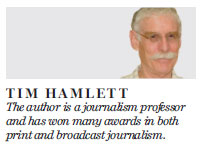It is time to think about the real value of a university education
Updated: 2015-11-09 08:08
By Tim Hamlett(HK Edition)
|
|||||||
What are universities for? Curiously, this is not a subject to which they themselves give much thought. But it has surfaced in other places recently. Perhaps the most drastic suggestion was from the columnist who proposed that subjects other than science, engineering and finance were a waste of time, and students who wished to pursue them should do so at their own expense. More moderate thinkers have mused on the implications of our much-expanded system, which allows and encourages employers who did not previously take on graduates to upgrade their requirements.
As this last point suggests, one function of universities is quite simple, though not much thought about: to sort out potential employees. If you ask employers what they want from a university they will come out with high-sounding stuff about creativity, critical thinking and suchlike. If you look at what they actually use, on the other hand, they want an egg-grading system. Faced with an avalanche of job applications the number can be simply trimmed by excluding those without a degree, or those without a good degree, or those without a good degree from a traditional university, until you get down to a number of people who can be interviewed.
Universities are not happy with this. Indeed they are increasingly unhappy with the idea that they are preparing people for work of any kind. If you look at where effort and money are lavished, actually universities see their main job as producing their own future staff. This leads to massive over-production of PhDs, and neglect for what most people suppose to be the main function of a university: educating undergraduates.
This is a recent development. Historically, universities were a European invention for the specific purpose of educating clergymen. They then developed a sort of sideline, providing education for rich people's kids who needed some notions of meaning, rightness and literacy to prepare them for lives of economic idleness but political power. Scholars, being themselves priests, could speak with authority on the meaning of life and the right way of leading it.
Naturally, as religion receded from its commanding position universities changed in both their purposes and their staff. The search for life skills and moral advice broadened to include ancient pagan authors. New subjects appeared.
Still, by the time I reached university as a student the main activity - at least at the ancient heap I attended - was in broad terms preparing undergraduates for life. Postgraduate study was discreetly discouraged, rather as the bank used to discourage new recruits from marrying local Chinese women. Your parents did not want you to be diverted from more important matters like doing the world's work. Colleges lined their dining hall walls with pictures of graduates who had become famous. One college had actually accumulated 12 prime ministers. A.J.P. Taylor used to tell promising history students that "PhDs are for mediocrities. Write a book."
So what went wrong? Basically, I suppose, the lunatics took over the asylum. Professors decided that research was their main activity. It has the advantage that it can only be assessed by them. So the academic community became a closed, self-validating world. Attempts to suggest that students should meet some external requirement are met with the dreaded retort: "trade school".
This problem is exacerbated by the league tables, which are derided and keenly studied at the same time. The league tables measure research in six different ways, and do not measure teaching at all. The main determinant of how much research you do is how much money you can spend on it. So the tables are dominated by old universities with large endowments and large universities in capital cities which are funded by their governments as prestige projects. There is almost no new information in the tables but human nature is sensitive to rankings generally.
The reply to these points is that local universities are genuinely committed to whole person education and lifelong learning. Are they? The appearance of an extra year coincided with a burst of enthusiasm for "general education". This is a euphemism for requiring students to take subjects from all over the university rather than the bit they chose when seeking admission. But this has nothing to do with preparing the students for life. It is the academic version of compulsory shopping. The student is wheeled into a succession of intellectual silos, which barely speak to each other, in the hope that the resulting buffet will produce some overall insights. Teaching first-year students is not a cherished activity and the classes will usually be large ones presided over by underpaid adjunct lecturers who have no job security, no research obligations, and no incentive to provide anything different.
I am not sure that replacing a year in high school with a year in university is an improvement. The highest aspiration of school teachers is to make a difference to the lives of their students. The highest aspiration of university teachers is to get out of teaching into full-time research.
It is not the universities' fault that the meaning of life and the best way of pursuing it now seem much more difficult topics than they did when people could just compare the rival insights of Aristotle and Aquinas. You can, I think, blame them for giving little or no thought to the basic question: Young people are in our care for four years; what are we doing for them?

(HK Edition 11/09/2015 page9)